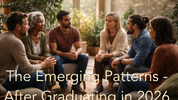- Have you ever been hard on yourself?
- Criticised yourself for not being good enough?
If so, you're not alone. And you're definitely not alone in being more than enough.
We are far more than our incredible flesh-and-bone bodies. We are expansive, multidimensional beings with untapped potential intellectually, emotionally, spiritually, and neurologically.
And yet… many of us have internalised the belief that we are somehow not good enough. Why?
There are countless possible roots:
- Tough love parenting – perhaps learned across generations.
- Rigid education systems – drilling facts while highlighting our “failings”
- Societal pressure – to achieve, to be perfect, to compare, to “do better"
When this message is repeated, subtly or bluntly, throughout life, it can become ingrained. If so many people suggest we’re not enough, maybe they’re right?
Let’s pause here.
What if, neurologically and spiritually, we’re actually wired not for failure but for growth, and it’s simply our approach to life that needs shifting?
Reframing Life as Learning
If we embrace life as an ongoing learning journey, we can draw upon Kolb’s Experiential Learning Cycle, a powerful model used by educators and organisations to design more meaningful and effective learning experiences.
Kolb’s model involves four key stages:
- Concrete Experience – Something happens (or doesn’t happen), and we feel the impact.
- Reflective Observation – We pause, look back, and explore our feelings and thoughts.
- Abstract Conceptualisation – We make sense of what happened and draw new insights.
- Active Experimentation – We apply our learning, try something new, and begin the cycle again.
This isn’t just theory. It’s a practice that allows us to grow from our experiences rather than shrink from them.
So Why Don’t We Always Learn?
Because we often skip the reflection stage.
Let’s take a common loop:
- Something goes wrong. We feel bad. Someone might even tell us we’ve failed.
- We don’t want to feel like we’ve failed, so we rush to try again, often in the same way.
- We hope for a better result, but if nothing has changed, often the result hasn’t either.
Sound familiar?
It’s what Einstein (perhaps) meant by the quote:
“Insanity is doing the same thing over and over again and expecting different results.”
Whether or not he said it, the wisdom stands.
The Missing Ingredient: Reflection
The truth is, we can’t reflect when we’re stressed. Our brains simply don’t work that way.
- Reflection needs space.
- Calmness.
- Slowness.
That’s why even something as simple as conscious breathing and counting calmly to ten can make all the difference. It reactivates your inner guidance system.
Once calm, ask your inner intelligence centres:
Head (forehead):
How can I improve the outcome?
Heart:
How can I improve the outcome?
Gut (belly button):
How can I improve the outcome?
Note any differences in the answers, and appreciate that “True Wisdom Is the Ability to Comprehend Multiple Perspective.” If in doubt about what to do, follow the Heart (brain). It might not make sense now, but that’s okay.
It’s what I call illogical-logical — decisions that don’t yet seem logical at first but later reveal their wisdom.
Society’s Speed ≠ Your Speed
Modern society increasingly demands quicker decisions. Technology has accelerated how fast messages travel, but just because messages move faster, we don’t have to.
In fact, this should allow us more time to pause, reflect and answer, not less.
Taking time to reflect, even for a few moments, isn’t laziness.
- It’s better risk management
- It's prudent leadership
- It’s wiser
Without it, we risk spiralling into poor decisions and damaged self-worth, especially if we carry subconscious fears of “being wrong.”
The Antidote? Daily Reflective Practice
This is exactly why I created the I Am Toot™, a daily self-coaching practice that provides a gentle, grounding way to ask ourselves enquiring reflective questions every day, reconnecting us with our inner knowing and raising our neurological level of awareness and realisation that we are enough. We always have been.
The learning cycle is always available to us:
- Concrete experience
- Reflection
- Conceptualisation
- Experiment
Then begin again.
Not because we are not good enough but because this is an approach for growth.
 unknownx500
unknownx500

